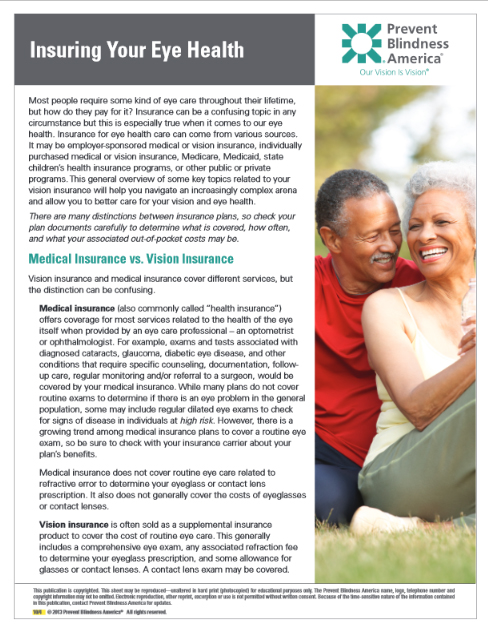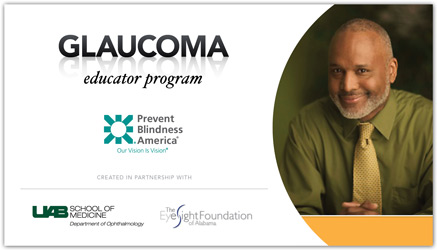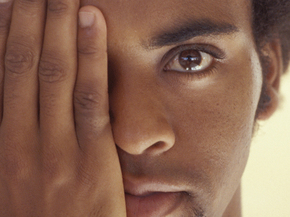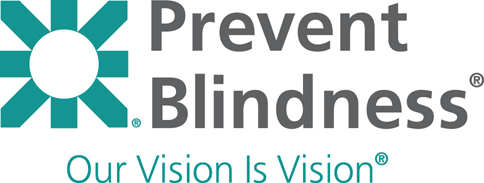- Health Emergency Home
- HED Current Projects Listing
- Spirituality, Health and Healing
- Family Health
- Men's Health
- Women's Health
- Child Health
- NBCI Health Television
- Health Notes
- Health Articles
- Health Books
- Food and Nutrition
- Physical Health and Fitness
- NBCI Clinical Approach Principles
- Health
Initiative
A to Z
NBCI Search
Blindness Prevention Articles and Literature
This document provided by Prevent Blindness contains key topics on eye health and will help you navigate to better care for your vision and eye health.

Glaucoma Awareness and African Americans
Many people don't know that after cataracts, glaucoma is the leading cause of blindness in African Americans and Hispanics. This cause of blindness is not reversible once it happens.
As you read this, you could be losing your sight and not realize it because the loss of sight often occurs very slowly.

Glaucoma Educator Course is a self-guided course for healthcare professionals, community health educators, and anyone responsible for glaucoma education for patients or clients.
The course covers the visual system and the signs, symptoms and treatments for glaucoma. It will also equip you to deliver patient education messages about; how glaucoma affects the eyes, the importance of prevention - which includes dilated comprehensive eye examinations, and strategies to prevent vision loss from the disease, during interactions with high-risk individuals.
The online course includes a 15 question post-test, downloadable participant guide and patient education fact sheets, and an opportunity to complete an evaluation. The course and education materials are available in English only at this time.
NBCI Partners with Prevent Blindness Through its Health Emergency Declaration

Founded in 1908, Prevent Blindness is the nation's leading volunteer eye health and safety organization dedicated to fighting blindness and saving sight. Focused on promoting a continuum of vision care, Prevent Blindness touches the lives of millions of people each year through public and professional education, advocacy, certified vision screening and training, community and patient service programs and research.
What are the leading causes of blindness?
In adults, the most common eye diseases are glaucoma, cataract, diabetic retinopathy and macular degeneration. In children, serious eye disorders include "lazy eye" (amblyopia), and strabismus (crossed eyes). Eye injuries in both adults and children, at home and the workplace, are also a leading cause of permanent sight loss.
Consider these important facts: Providing funds to sight-saving research studies has been part of our mission for more than 100 years.
Providing funds to sight-saving research studies has been part of our mission for more than 100 years.
We want to encourage researchers across the globe to continue to look for new ways to help end significant vision loss and blindness. - Hugh R. Parry, President and CEO of Prevent Blindness
Unfortunately, glaucoma attacks the eyes earlier and progresses faster in African Americans. Glaucoma has been reported to occur about 10 years earlier in African Americans than in other ethnic populations.
Additionally, African Americans are at an even greater risk of developing glaucoma if they have: Although we don't know why African Americans have a higher rate of glaucoma and subsequent blindness, we do know that African Americans are genetically more at risk for glaucoma.
Although we don't know why African Americans have a higher rate of glaucoma and subsequent blindness, we do know that African Americans are genetically more at risk for glaucoma.
Fortunately, there are several treatments available for glaucoma. They include eye drops, laser treatments and surgery. Your ophthalmologist will determine the best treatment or combination of treatments for your particular type and extent of disease. The overall goal is to reduce the eye pressure to allow the fluid in the eye to drain properly and to prevent further eye damage and loss of sight.
The American Academy of Ophthalmology advises the pubic that the best defense against developing glaucoma-related blindness is by having routine, comprehensive eye exams. They recommend a baseline examination at least by age 40, although, www.glaucoma.org, recommends that African Americans get a thorough check for glaucoma every one to two years after age 35.
What are the leading causes of blindness?
In adults, the most common eye diseases are glaucoma, cataract, diabetic retinopathy and macular degeneration. In children, serious eye disorders include "lazy eye" (amblyopia), and strabismus (crossed eyes). Eye injuries in both adults and children, at home and the workplace, are also a leading cause of permanent sight loss.
Consider these important facts:
 Providing funds to sight-saving research studies has been part of our mission for more than 100 years.
Providing funds to sight-saving research studies has been part of our mission for more than 100 years. We want to encourage researchers across the globe to continue to look for new ways to help end significant vision loss and blindness. - Hugh R. Parry, President and CEO of Prevent Blindness
- More than 1.1 million Americans are legally blind and an additional 50,000 people lose their sight each year, yet half of all blindness can be prevented.
- Between 2 and 3 million people have glaucoma...but half don't even know it.
- Blindness is the number one disabling complication of diabetes. Diabetic retinopathy is one of the leading causes of new cases of blindness.
- One in every 20 preschool children has an eye problem that, if left uncorrected, can lead to permanent vision loss.
- Nearly 2,000 potentially blinding workplace eye injuries happen each day.
Unfortunately, glaucoma attacks the eyes earlier and progresses faster in African Americans. Glaucoma has been reported to occur about 10 years earlier in African Americans than in other ethnic populations.
Additionally, African Americans are at an even greater risk of developing glaucoma if they have:
- Extreme nearsightedness (you can't see things that are far away)
- Diabetes
- Hypertension
- Prolonged steroid use
- Or are over age 40
 Although we don't know why African Americans have a higher rate of glaucoma and subsequent blindness, we do know that African Americans are genetically more at risk for glaucoma.
Although we don't know why African Americans have a higher rate of glaucoma and subsequent blindness, we do know that African Americans are genetically more at risk for glaucoma.Fortunately, there are several treatments available for glaucoma. They include eye drops, laser treatments and surgery. Your ophthalmologist will determine the best treatment or combination of treatments for your particular type and extent of disease. The overall goal is to reduce the eye pressure to allow the fluid in the eye to drain properly and to prevent further eye damage and loss of sight.
The American Academy of Ophthalmology advises the pubic that the best defense against developing glaucoma-related blindness is by having routine, comprehensive eye exams. They recommend a baseline examination at least by age 40, although, www.glaucoma.org, recommends that African Americans get a thorough check for glaucoma every one to two years after age 35.
































